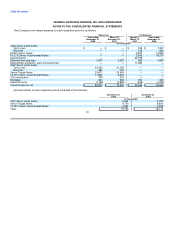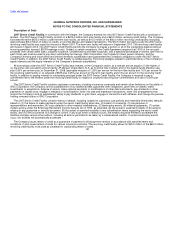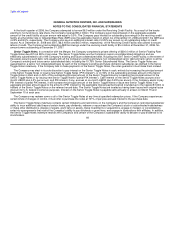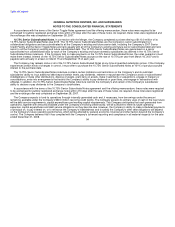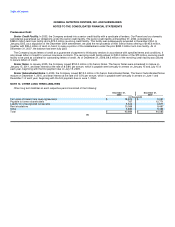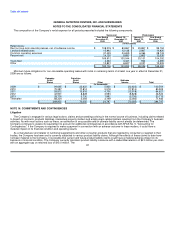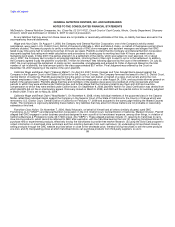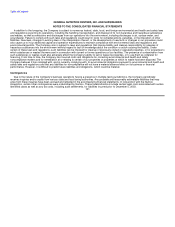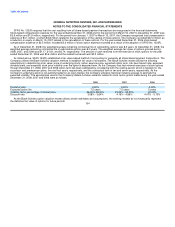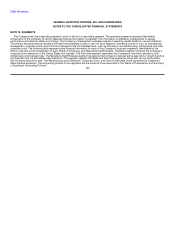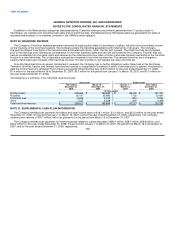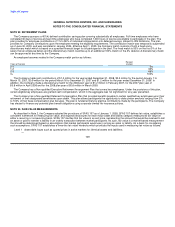GNC 2009 Annual Report Download - page 105
Download and view the complete annual report
Please find page 105 of the 2009 GNC annual report below. You can navigate through the pages in the report by either clicking on the pages listed below, or by using the keyword search tool below to find specific information within the annual report.
Table of Contents
GENERAL NUTRITION CENTERS, INC. AND SUBSIDIARIES
NOTES TO THE CONSOLIDATED FINANCIAL STATEMENTS
McDonald v. General Nutrition Companies, Inc. (Case No. 02 CH 14122, Circuit Court of Cook County, Illinois, County Department, Chancery
Division), which was dismissed on October 4, 2007 for want of prosecution.
As any liabilities that may arise from these cases are not probable or reasonably estimable at this time, no liability has been accrued in the
accompanying financial statements.
Wage and Hour Claim. On August 11, 2006, the Company and General Nutrition Corporation, one of the Company's wholly owned
subsidiaries, were sued in U.S. District Court, District of Kansas by Michelle L. Most and Mark A. Kelso, on behalf of themselves and all others
similarly situated. The lawsuit purports to certify a nationwide class of GNC store managers and assistant managers and alleges that GNC
failed to pay time and a half for working more than 40 hours per week. Plaintiffs contend that the Company and General Nutrition Corporation
improperly applied fluctuating work week calculations and procedures for docking pay for working less than 40 hours per week under a
fluctuating work week. In May 2007, the parties entered in to a settlement of the claims, which was subject to court approval. On or about
July 3, 2007, the Company sent a notice to all potential claimants, informing them of their right to elect to opt in to the settlement. In addition,
the Company agreed to pay the plaintiffs' counsel $0.7 million for attorneys' fees following approval by the court of the settlement. On July 23,
2007, the court approved the settlement of claims as fair, reasonable, and adequate and entered its Order of Approval. Based on the total
number of opt-in plaintiffs, the total amount paid to the class approximated $0.1 million. Final Judgment was entered by the Court on
December 18, 2007 disposing of the claims of the opt-in plaintiffs.
California Wage and Break Claim ("Casarez Matter"). On April 24, 2007, Kristin Casarez and Tyler Goodell filed a lawsuit against the
Company in the Superior Court of the State of California for the County of Orange. The Company removed the lawsuit to the U.S. District Court,
Central District of California. Plaintiffs purported to bring the action on their own behalf, on behalf of a class of all current and former non-
exempt employees of the Company throughout the State of California employed on or after August 24, 2004, and as private attorney general on
behalf of the general public. Plaintiffs allege that they and members of the putative class were not provided all of the rest periods and meal
periods to which they were entitled under California law, and further allege that the Company failed to pay them split shift and overtime
compensation to which they were entitled under California law. On September 9, 2008, plaintiffs' Motion for Class Certification was denied from
which plaintiffs did not file an interlocutory appeal. Discovery closed on March 9, 2009, and GNC will file a partial motion for summary judgment
in March 2009. Trial is set for May 26, 2009.
California Wage and Break Claim ("Abad Matter"). On November 4, 2008, ninety individual members of the purported class in the Casarez
Matter refiled their individual claims against the Company in the Superior Court of the State of California for the County of Orange which was
removed to U.S. District Court, Central District of California on February 17, 2009 and assigned to the same judge hearing the related Casarez
matter. The Company is vigorously defending these matters. Any liabilities that may arise from these matters are not probable or reasonably
estimable at this time.
Franchise Class Action. On November 7, 2006, Abdul Ahussain, on behalf of himself and all others similarly situated, sued GNC
Franchising, LLC ("GNCF") and General Nutrition Corporation in the U.S. District Court, Central District of California, Western Division. Plaintiff
alleged that GNC engages in unfair business practices designed to earn a profit at its franchisees' expense, among other things, in violation of
California Business & Professions Code, §§ 17200 et seq. (the "CBPC"). These alleged practices include: (1) requiring its franchises to carry
slow moving products, which cannot be returned to GNC after expiration, with the franchise bearing the loss; (2) requiring franchised stores to
purchase new or experimental products, effectively forcing the franchisees to provide free market research; (3) using the Gold Card program to
collect information on franchised store customers and then soliciting business from such customers; (4) underselling its franchised stores by
selling products through the GNC website at prices below or close to the wholesale price, thereby forcing franchises to sell the same products
at a loss; and (5) manipulating prices at which franchised stores can purchase products from third-party suppliers, so as to
99




